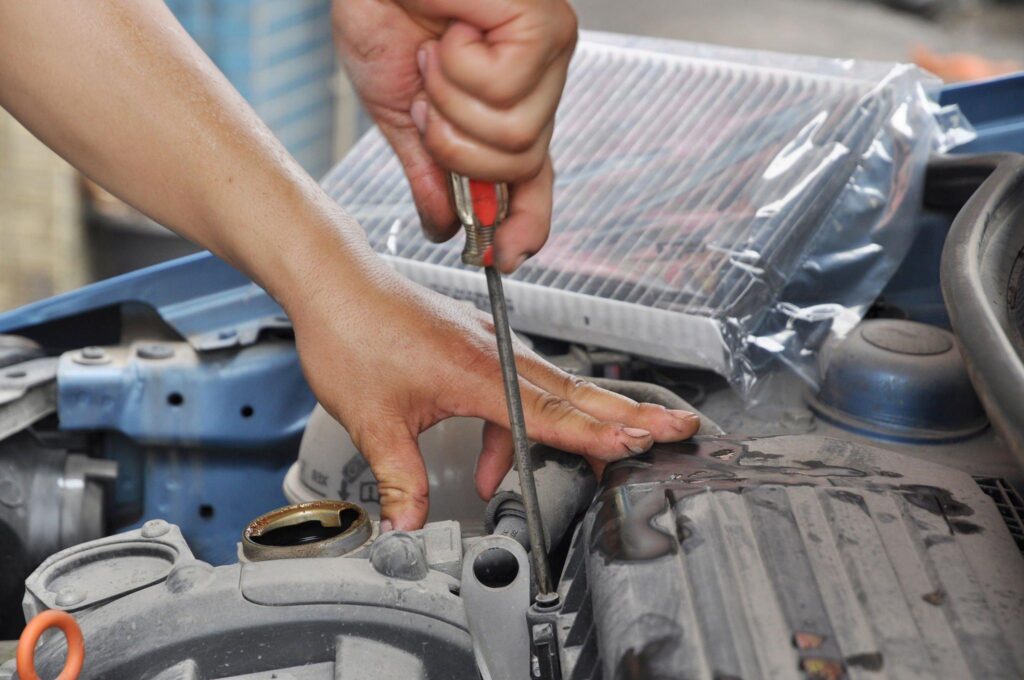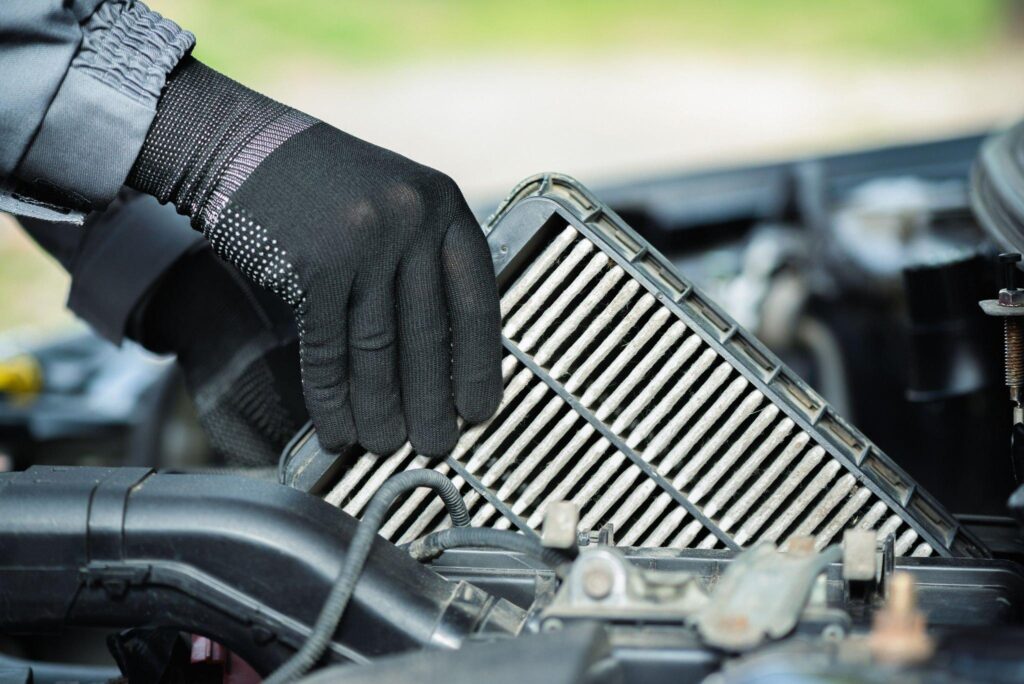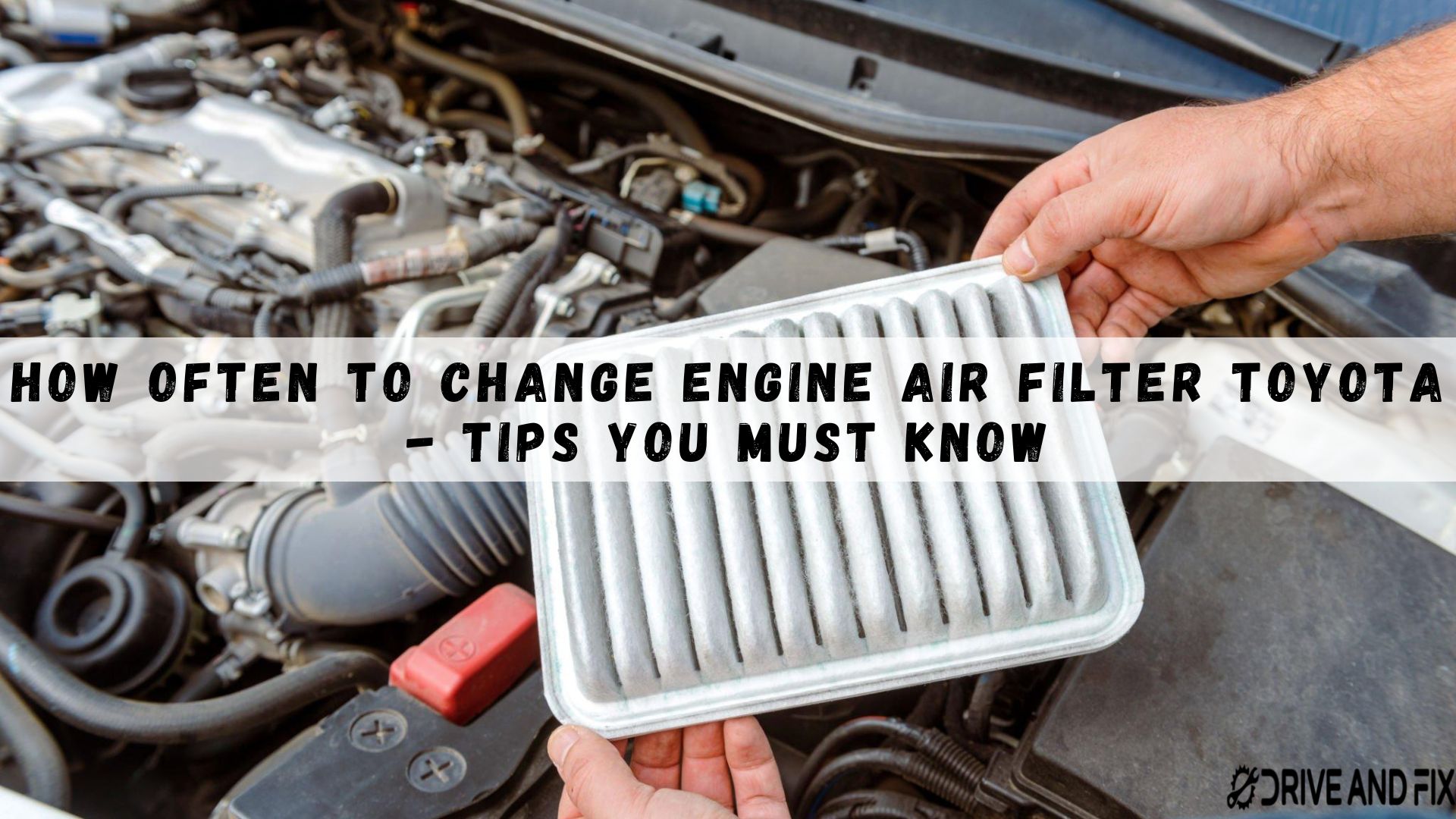Your car’s engine is like a finely-tuned machine, with each component working together to ensure smooth and efficient operation. The engine air filter is one of the critical components that play a crucial role in your car’s performance. This filter helps prevent harmful debris, dust, and other particles from entering the engine, which can cause damage and impact the engine’s performance. Maintaining a clean air filter ensures your car runs smoothly and efficiently. Please read this article as we cover everything you need to know about how often to change engine air filter in Toyota vehicles. Get ready to boost your car’s performance and prolong its lifespan with a simple but crucial step: changing your car’s engine air filter.
How Often To Change Engine Air Filter Toyota – Recommended Frequency

Toyota recommends changing the engine air filter every 12,000 to 15,000 miles or once a year, depending on driving conditions. The frequency of filter changes can vary based on factors such as the environment in which you drive, the amount you go, and how hard you drive. However, sticking to a schedule of changing the filter every 12,000 to 15,000 miles or once a year can help ensure your engine stays protected from harmful particles and continues to perform optimally. It is always advisable to consult the vehicle’s owner’s manual for specific recommendations regarding filter changes.
Factors Affecting Engine Air Filter Change Frequency
Several factors can impact the frequency of filter changes, including:
- Driving conditions: If you frequently drive in dusty or sandy areas, your car engine air filter may become clogged more quickly, requiring frequent changes.
- Driving style: Hard acceleration, aggressive driving, and frequent high-speed driving can put more strain on the engine and air filter, potentially requiring more frequent changes.
- The amount has driven: If you drive frequently or cover long distances, your air filter may need to be changed more often than if you drive less.
Consider these factors when determining how often to change the filter on your Toyota. Regularly checking the filter and changing it when necessary can help ensure that your engine stays protected and continues to perform optimally.
Why You Must Change Engine Air Filter
- Preventing debris and dust from entering the engine
The engine air filter helps prevent debris, dust, and other particles from entering the engine, which can cause damage and negatively impact performance.
- Protecting the engine
Debris and dust can cause wear and tear on engine components, leading to costly repairs. Keeping the filter clean can help protect the engine from damage.
- Preserving engine performance
A dirty air filter can restrict airflow to the engine, causing a decrease in power and acceleration. Replacing the filter regularly can help maintain optimal engine performance.
- Improving fuel efficiency
Clean air filter allows for proper airflow to the engine, improving fuel efficiency and saving you money.
Recommended Distance for changing air filter by Toyota Car’s Model
Car Model | Recommended replacement (extreme) | Recommended replacement (normal) | Importance of checking |
| Toyota RAV4 | 10,000 miles | 15,000 – 30,000 miles | Important |
| Toyota Camry | 10,000 miles | 15,000 -30,000 miles | Very important |
| Toyota Highlander | 10,000 miles | 15,000 – 30,000 miles | Extremely important |
| Tacoma | 10,000 miles | 15,000 -30,000 miles | Very important |
| Toyota Sienna | 10,000 miles | 15,000 – 30,000 miles | Tremendously important |
| Toyota Tundra | 10, 000 miles | 15,000 – 30,000 miles | Very important |
| Toyota Corolla | 10,000 miles | 15,000 -30,000 miles | Extremely Important |
Signs Of A Dirty Air Filter
Several signs indicate it is time to change your car’s engine air filter, including:
- Reduced engine performance: If you notice a decrease in power and acceleration, it could be a sign that the filter is dirty and needs to be changed.
- Engine “Check Engine” light turning on: A dirty air filter can cause engine performance problems and trigger the “Check Engine” light to turn on.
- Poor fuel economy: If your vehicle’s fuel efficiency has decreased, it may be due to a dirty filter restricting airflow to the engine.
- Unusual engine sounds: A dirty filter can cause the machine to work harder, leading to unusual sounds such as rough idling or knocking.
- Visually inspecting the air filter: You can visually check it to determine if it needs to be changed. If it appears dirty and clogged with debris, it’s time to replace it.
If you see any of these signs, change the filter as soon as possible to help protect the engine and maintain optimal performance.
Read Also: How Much Does It Cost to Change Car Interior Color?
Steps To Change The Engine Air Filter On A Toyota Vehicle:

Step 1: Locate the air filter. The air filter is usually located in the engine compartment, near the throttle body or air cleaner housing.
Step 2: Release the air filter housing – Release the clamps or latches that hold the air filter housing in place.
Step 3: Remove the old air filter – Carefully remove it from the housing and inspect it for debris, dust, or other contaminants.
Step 4: Replace the air filter – Place the new filter into the housing, ensuring it is securely in place and the seals are correctly seated.
Step 5: Close the air filter housing – Secure the clamps or latches to hold the air filter housing in place.
Step 6: Check for leaks – Start the engine and inspect the air filter housing and surrounding areas for any leaks.
Step 7: Test drive – Take the vehicle for a test drive to ensure the engine runs smoothly.
Note: This is a general outline; specific instructions may vary based on the model and year of your Toyota vehicle. It is always advisable to consult the vehicle’s owner’s manual for specific instructions and guidelines regarding air filter changes.
FAQ’s
Can a dirty air filter affect my Car’s emissions levels?
Yes, dirty air filter can increase the emissions levels of your Car. This is because a clogged air filter restricts the flow of air to the engine, causing it to emit more pollutants.
Can I change the engine air filter on my car myself?
Changing an air filter in your car is a simple task that you can complete with a few simple tools. You don’t have to be a car expert or mechanic to do it. We provide a step-by-step guide above to help you. Just follow them and you’ll have a clean air filter for your car. It not only helps you to keep your car running smoothly, but you’ll also save money and time.
Is it okay to use an aftermarket air filter in my Car?
It is possible to use an aftermarket engine air filter in your Car, but it is always recommended to use a genuine filter or parts for best results. Aftermarket filters may not fit and also can affect the performance of your engine.
How much does it cost to change the engine air filter in a Toyota?
The cost of replacing the air filter in your Toyota can vary depending on the model, location, and type of filter you used. You can expect to spend anywhere from $20 to $45 for an engine air filter and $15 to $35 for a cabin air filter. But keep in mind that prices may be different for different Toyota models.
Final Thoughts
So now you understand how often to change engine air filter Toyota, maintaining the health and performance of your car. Regular air filter changes are recommended every 12,000 to 15,000 miles or once a year, depending on driving conditions and other factors.
Now talking about the air inside your car? Do you ever think that it’s OK to sit in your car with the AC on? To know more about this read on: Is it OK to Sit in Car with AC On? Here’s the Answer
You May Also Interest:
The Essential Guide to Blown AC Fuse In Car Symptoms
Why Car AC Stops Blowing Cold Air After A While -Troubleshooting Tips
Blown Fuse Car Won’t Start? Here’s What You Need to Know
Why Brake and Battery Light On After Replacing Alternator?
What to Do When Your Battery Light Stays On After Key Pulled?


